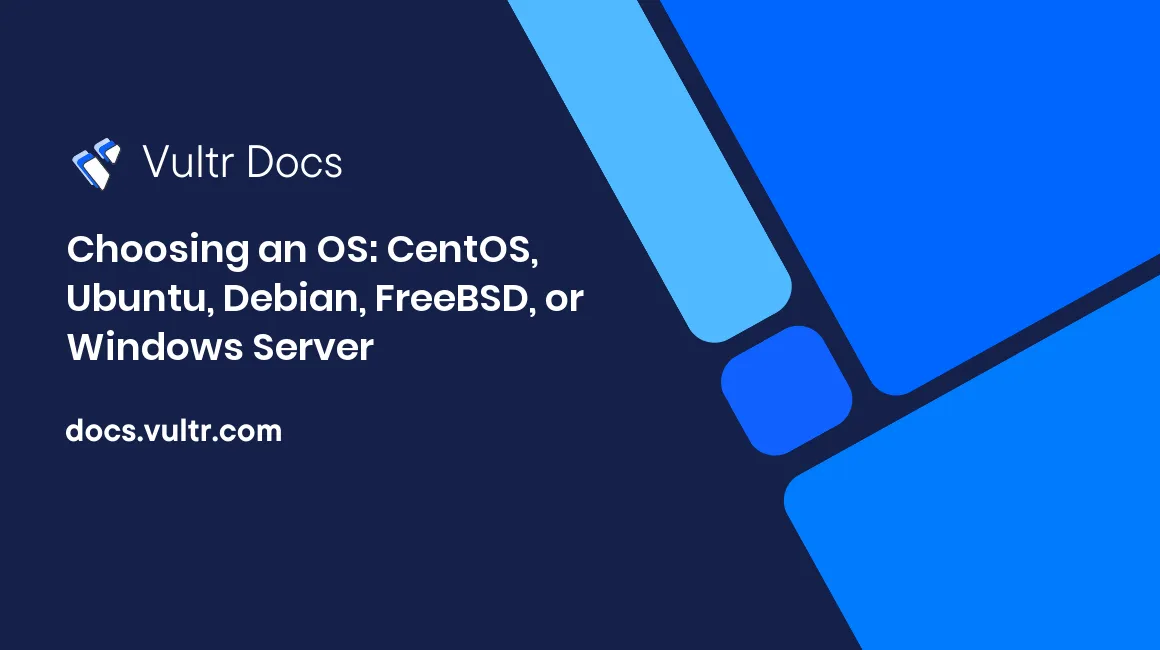
This article provides a brief synopsis of the server operating systems offered as templates on Vultr.
centos">CentOS
CentOS is an open-source version of RHEL (Red Hat Enterprise Linux). Created in 2004, CentOS is used widely in the hosting industry. Benefits include:
- Easy to use for beginner level administrators.
- Has long term support for certain versions (up to ten years).
- Includes a simple package manager:
yum(ordnfon newer releases) - Compatible with cPanel, and a variety of other server control panels.
- Offered by industry leader, Red Hat.
Trade-offs include:
- An irregular development cycle. Major releases don't happen on a set cycle; they happen every 3-5 years.
- Due to long release periods, bundled software support is dated compared to other flavors of Linux.
debian">Debian
Debian is a long-term-supported Linux distribution known for its universal compatibility. Benefits include:
- Support for many architectures ( x86, x64, ARM, etc ).
- Modern Linux kernel.
- Large package repository.
- Long term support.
- Multiple desktop environment support.
fedora">Fedora
Fedora is a cutting edge Linux distribution. It is part of the CentOS and RHEL family. The main goals of the distribution include:
- Latest kernel and software package versions.
- Short lifespan (13 months).
- New releases roughly every 6 months.
freebsd">FreeBSD
FreeBSD is a flavor of BSD, which is a version of UNIX developed at the University of California, Berkeley. It is reliable, stable and has been updated for over 20 years. Benefits include:
- Long term support.
- Very lightweight.
- Includes a package manager and port building system.
Trade-offs include:
- Ports of Linux packages can take a long time.
- Older filesystem design than other server operating systems.
openbsd">OpenBSD
OpenBSD is a UNIX-like operating system with a strong focus on security and cryptography. Benefits include:
- New releases roughly every 6 months.
- Lightweight UNIX operating system.
- Security features not available in other operating systems.
Trade-offs include:
- Routine system administration tasks can become more complicated due to additional security.
- Less popular than other server operating systems.
ubuntu">Ubuntu
Ubuntu is recognized for its stability and its large list of features. Benefits include:
- Better software support.
- Easy-to-use package manager:
apt - Regular update cycles.
- 5 year LTS (Long Term Support) templates available.
The regular updates and additional packages bundled into the installation create several trade-offs. These include:
- Uses more disk space than other distributions.
- Shorter LTS compared to CentOS.
windows-server">Windows Server
Windows Server is the server edition of the popular desktop operating system created by Microsoft. It is a closed-source operating system which requires license management. Vultr deployments handle license management automatically. Benefits include:
- Supported by Microsoft.
- Regular updates (from every few days to months).
- Very long term support (more than 10 years).
- User-friendly GUI (graphical user interface).
- Great software compatibility.
Trade-offs include:
- Licensing increases overall cost.
- Closed source platform.
- Programs can be more difficult to configure than on Linux/BSD.
No comments yet.